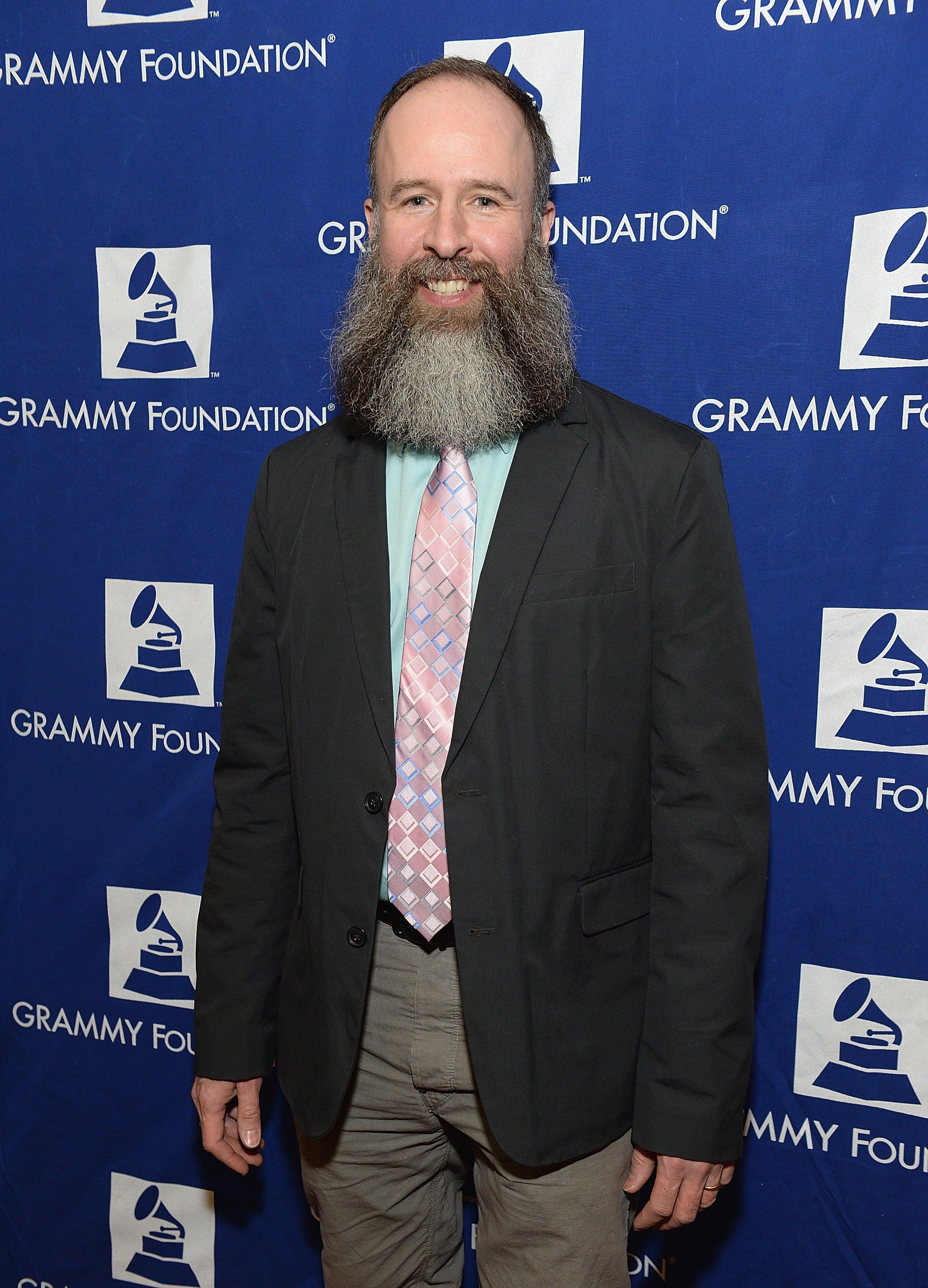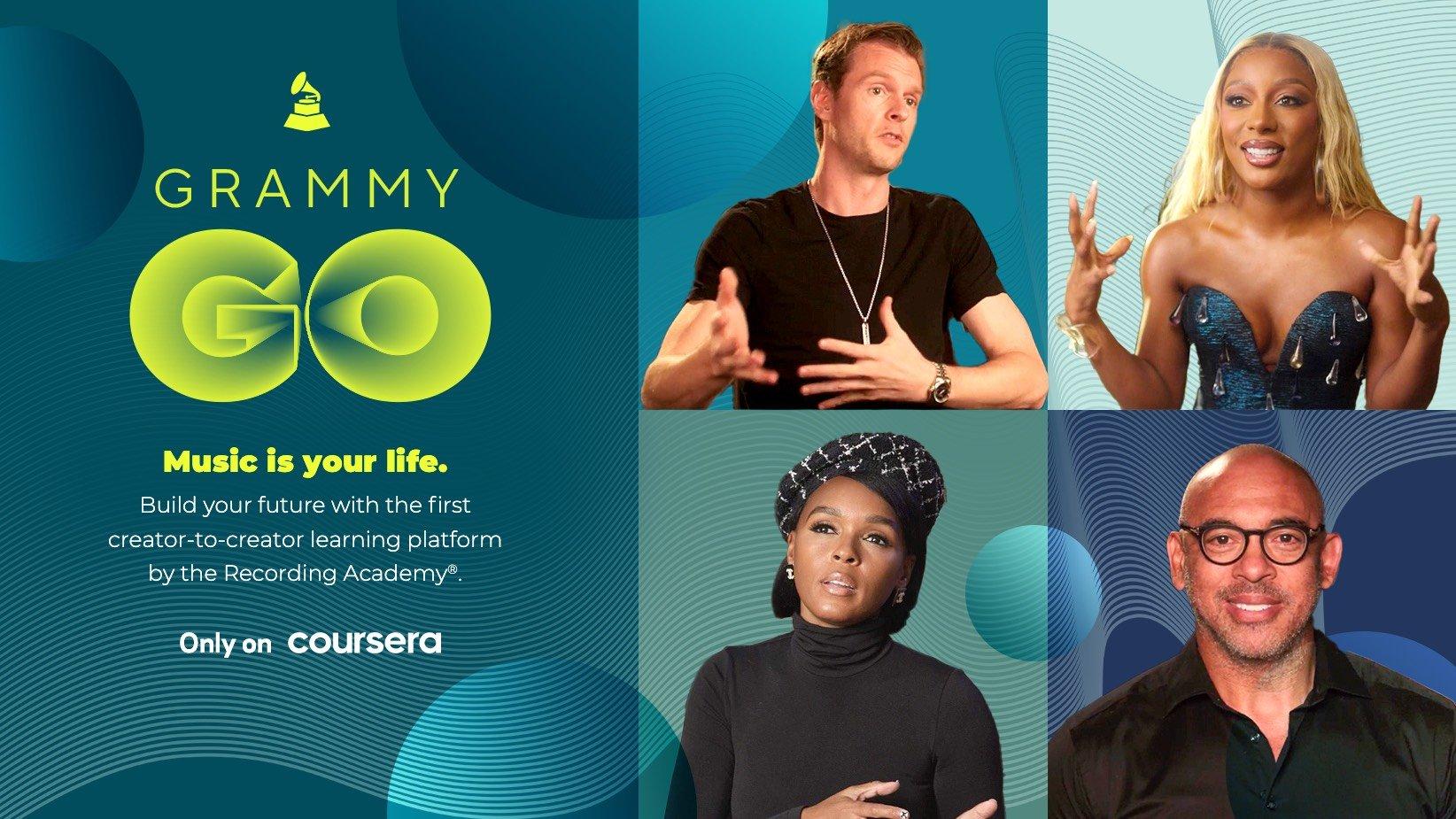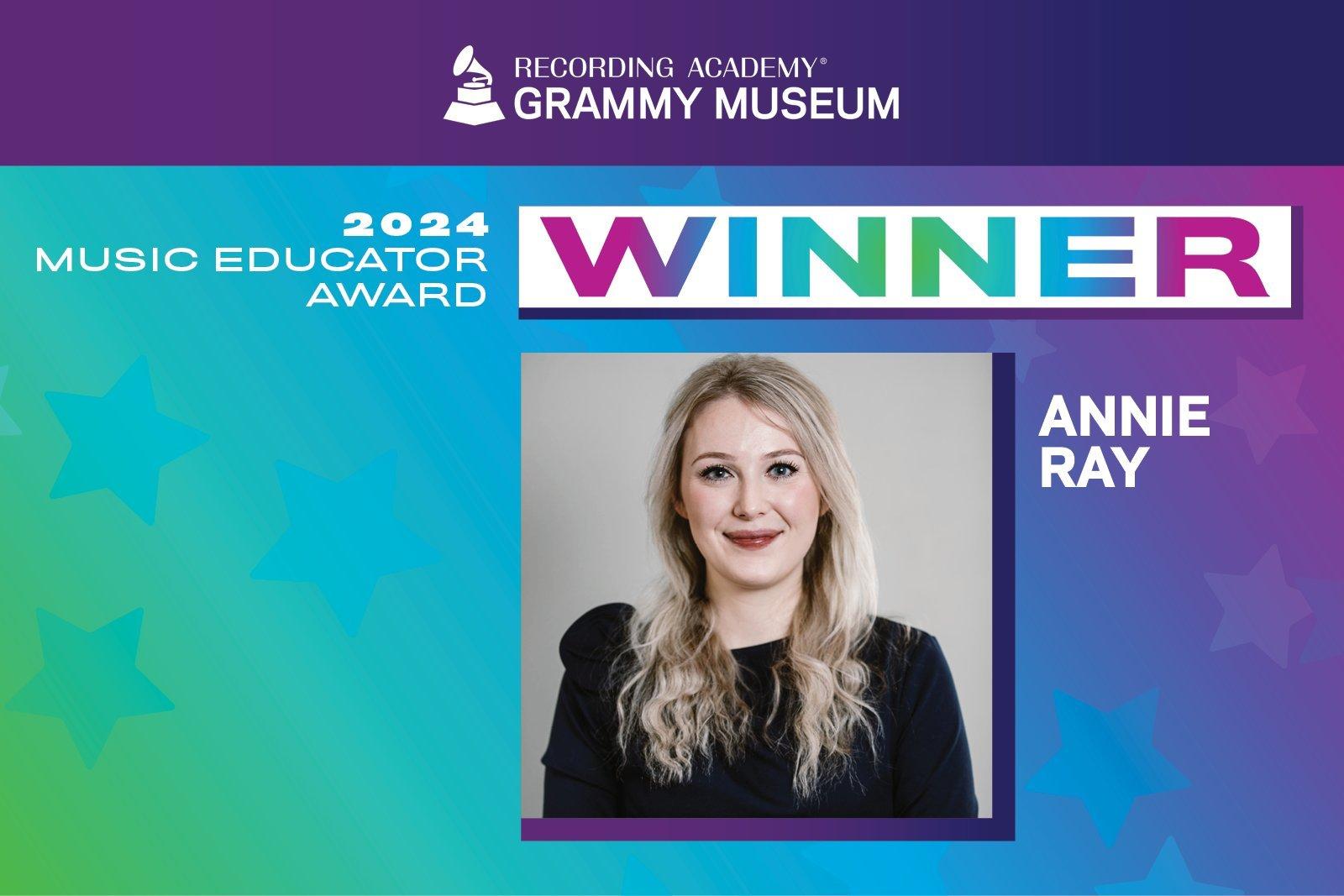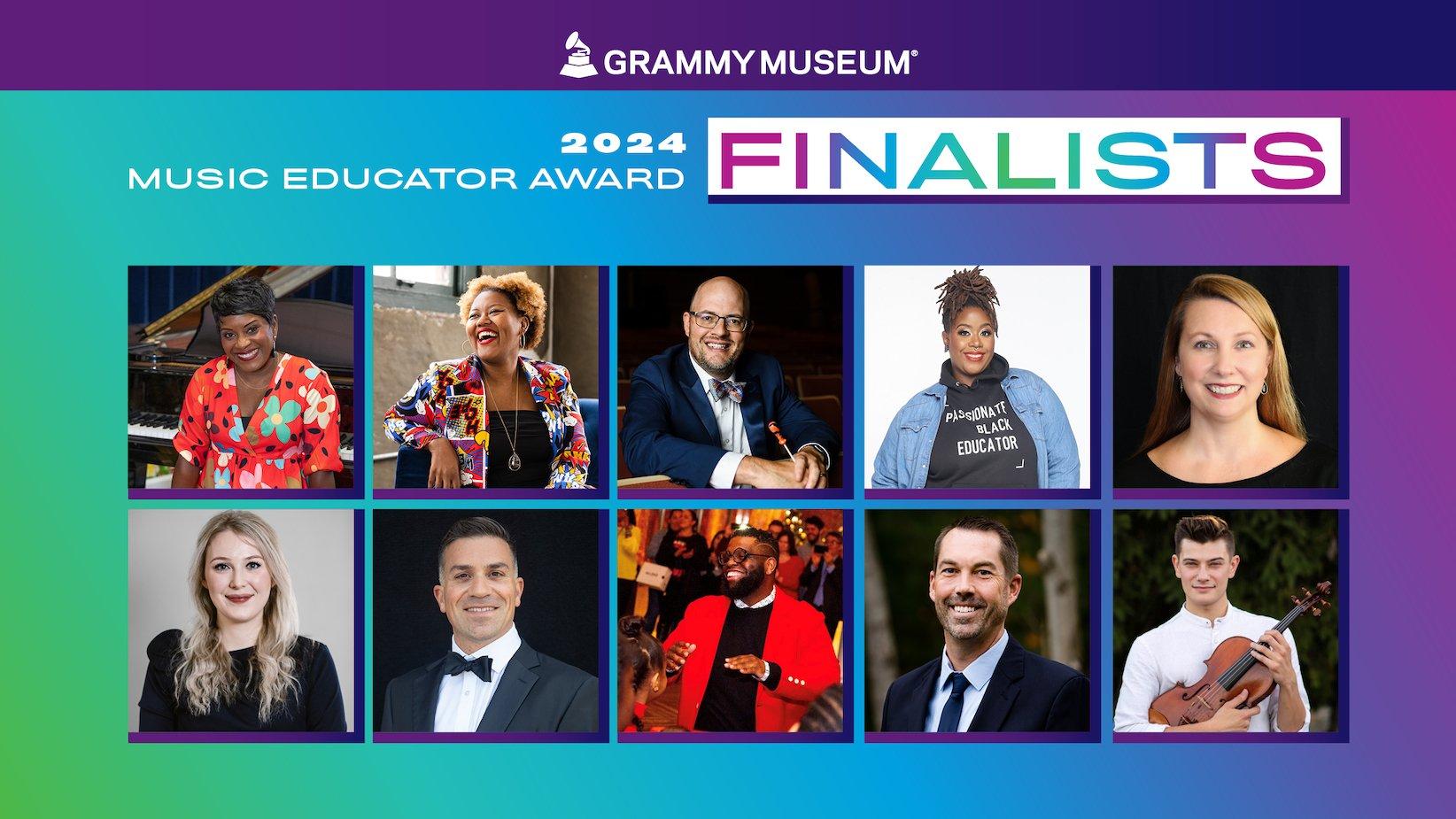Photo: Michael Kovac/WireImage.com

news
Kent Knappenberger: The GRAMMY.com Interview
Inaugural Music Educator Award recipient reveals why he is thankful for the honor and discusses his approach to teaching and advocacy for music education
Kent Knappenberger of Westfield Academy and Central School in Westfield, N.Y., is the recipient of the first annual Music Educator Award presented by The Recording Academy and the GRAMMY Foundation. The award was established to recognize current educators (kindergarten through college, public and private schools) who have made a significant and lasting contribution to the field of music education and who demonstrate a commitment to the broader cause of maintaining music education in schools.
"The award goes a long way, and will continue to go a long way, in recognizing the important job music educators do," says Knappenberger.
Knappenberger will travel to Los Angeles to receive the award at the Special Merit Awards Ceremony & Nominees Reception on Jan. 25 and attend the 56th Annual GRAMMY Awards ceremony on Jan. 26. In an exclusive GRAMMY.com interview, Knappenberger discussed advocacy for music education, his approach to teaching and his thoughts on being selected as the inaugural Music Educator Award recipient.
How does it feel to win the first-ever Music Educator Award?
I'm very honored! It's a great chance to act as an advocate for music education on many levels, one of which is that it's always under threat as music programs get cut with regularity. Receiving the [Music Educator Award] gives me opportunities to talk about the reasons why [music is important].
The award goes a long way, and will continue to go a long way, in recognizing the important job music educators do. That's the biggest thing to be thankful for.
How would you describe your overall approach to teaching music?
I believe music to be part of a life well-lived, and I take a rather broad definition of music as life abstracted through sound. This makes for a kind of overarching umbrella in how music is taught in my classroom. There are basically three ways we experience music: through listening, composing or performing. The basis of all our classroom lessons ultimately has to be one of those actions.
What are your top priorities in advocacy for music education?
There are three: advocating for music education's existence in educational systems, for reaching a broader-based student population and for a paradigm shift in how we normally think of music in schools.
How does advocacy work in your school?
We've made it a point to advocate for our own programs, but the high involvement of our students and their successes have created their own advocacy. I've been best able to advocate by setting ourselves as an example of what happens when a broader student population is successfully targeted.
How do you get significant numbers of students studying music?
There are kids in our music classes who play in band, others who sing in choir and some who don't participate in any traditional performing ensemble but are enthusiastic learners in the personal music skills taught in general music. This aspect of music education is sometimes looked at as the place where kids get dumped. It's just because teachers haven't known what to do.
Music class is something lively and interesting in which anyone can participate. It's doing music, living it and making it happen. For instance, any student who takes a general music class can be in our hand bell ensemble. There are no prerequisites. Annually, more than half our high school is involved in music classes.
What's one of your most satisfying achievements as a music educator?
In 2011 we submitted a recording of our American/Celtic string band to perform at our annual New York State School Music Association music teachers conference. Traditionally, the top performing ensembles featured at NYSSMA conferences are from well-funded suburban districts and are fed by a system of younger choirs, bands or orchestras.
Students in top performing ensembles usually are selected by audition, but the string band at our school is made up of any interested students taking general music class, including all kinds of learners, from college-bound accelerated students, to students with autism, to students in special education, to every other type of learner imaginable.
Was the community at large included?
Grandparents, parents, teachers in our school, some amateur musicians, home-schooled students, and even local professional musicians all participated. NYSSMA accepted us, and we were able to share this different kind of inclusive, intergenerational, community-based ensemble with an appreciative audience of music educators. Based on this performance, we were invited to perform at the biennial All-Eastern music conference the following year.
So the community involvement was effective in building grassroots music education advocacy?
Yes, and if music education is going to survive, we have to think about how we can help the general population learn and become engaged. If we do, public support will grow. I've seen it happen, and this was one way to accomplish that.
How do you meet the challenges of funding music programs?
I compose and arrange, and I found out that if I write the arrangements for our school, I'm free to use the sheet music budget to purchase equipment. That's how we ended up with a set of steel drums, hand bells, secondhand computers, and a battery of folk instruments, including Celtic harps, hammered dulcimers, mandolins, guitars, Irish whistles, and more!
Our ensembles that perform out of district make it a priority to be a model of how to use our funding most economically to impact the most students.
How do you keep students motivated?
An important aspect of music study and effective learning is where the students' own motivation and ability to find meaning and personal relevance are central to their learning and musical process. So we listen, compose and perform with purpose, and try to model that purpose in "real life" and in-life use as much as possible.
This may be making recordings, learning a piece of a student's own choosing, or composing a melody for lyrics written by another student. Students can begin a cycle of self-competency in music, which often is a key to future learning.
Would you elaborate on music study as a gateway to self-competency?
Adolescents' likes and dislikes are often centered in areas where they feel worthy or competent. The musical experience of an adolescent should be filled with ample opportunity to learn, so we try to create an environment where the outcome is undetermined and the actions of the student are all-important in controlling how things turn out. For instance, are we following a recipe, or is there the excitement of many possibilities of a successful performance? How will the composition sound once we write it? The possibilities are endless.
Teachers owe our students to accept them as they are, yet see what they might become [and] to create opportunities for those young persons to see in themselves what they didn't see before.
What are some ways your students' endeavors have extended beyond the classroom?
Twenty years ago, I learned that three churches in our small town had hand bell choirs. We taught students to play hand bells so those kids with church involvement can play music there, and students also play in other community hand bell ensembles.
A few years ago, a large number of our students were involved in a fundraiser to fight world hunger. I offered to write and direct a musical the kids could perform rights- and royalty-free and donate the proceeds. Not only did they contribute several thousand dollars to fight world hunger, they also used proceeds to support acquiring malaria nets for Africa, providing scholarships to a local preschool, and building a well in Africa.
It's inspiring to see how music can bring kids together to create something special and to do good in the world. I love my job!
(Laurel Fishman is a writer and editor who specializes in entertainment media. She is an advocate for the benefits of music making, music listening, music education, music therapy, music-and-the-brain research, and music and interdisciplinary studies.)

Graphic & Photos Courtesy of GRAMMY GO
news
Recording Academy & Coursera Partner To Launch GRAMMY GO Online Learning Initiative
Class is in session. As part of the Recording Academy's ongoing mission to empower music's next generation, GRAMMY Go offers digital content in specializations geared to help music industry professionals grow at every stage of their career.
The Recording Academy has partnered with leading online learning platform Coursera on GRAMMY GO, a new online initiative to offer classes tailored for music creators and industry professionals.
This partnership empowers the next generation of the music community with practical, up-to-the moment digital content that provides wisdom for both emerging and established members of the industry. Continuing the Academy’s ongoing mission to serve all music people, courses cover a variety of specializations tailored to creative and professional growth.
GRAMMY GO on Coursera includes courses taught by Recording Academy members, featuring GRAMMY winners and nominees and offers real-life lessons learners can put to work right away.
Starting today, enrollment is open for GRAMMY GO’s first Coursera specialization, "Building Your Audience for Music Professionals," taught by Joey Harris, international music/marketing executive and CEO of Joey Harris Inc. The course features Rock & Roll Hall of Fame inductee and five-time GRAMMY winner Jimmy Jam, 10-time GRAMMY nominee Janelle Monáe and three-time GRAMMY winner and the 2024 GRAMMYs Best New Artist Victoria Monét. This foundational specialization will help participants gain the skills, knowledge and confidence to build a strong brand presence and cultivate a devoted audience within the ever-changing music industry.
The partnership’s second course, launching later this summer, aims to strengthen the technological and audio skills of a music producer. "Music Production: Crafting An Award-Worthy Song" will be taught by Carolyn Malachi, Howard University professor and GRAMMY nominee, and will include appearances by GRAMMY winner CIRKUT, three-time GRAMMY winner Hit-Boy, artist and celebrity vocal coach Stevie Mackey, five-time GRAMMY nominee and Recording Academy CEO Harvey Mason jr., and 15-time GRAMMY winner Judith Sherman. Pre-enrollment for "Music Production: Crafting An Award-Worthy Song" opens today.
"Whether it be through a GRAMMY Museum program, GRAMMY Camp or GRAMMY U, the GRAMMY organization is committed to helping music creators flourish, and the Recording Academy is proud to introduce our newest learning platform, GRAMMY GO, in partnership with Coursera," said Panos A. Panay, President of the Recording Academy. "A creator’s growth path is ongoing and these courses have been crafted to provide learners with the essential tools to grow in their professional and creative journeys."
"We are honored to welcome GRAMMY GO, our first entertainment partner, to the Coursera community," said Marni Baker Stein, Chief Content Officer at Coursera. "With these self-paced online specializations, aspiring music professionals all over the world have an incredible opportunity to learn directly from iconic artists and industry experts. Together with GRAMMY GO, we can empower tomorrow's pioneers of the music industry to explore their passion today."
GRAMMY GO also serves as the music community’s newest digital hub for career pathways and editorial content that provides industry insights for members of the industry; visit go.grammy.com for more. For information and enrollment, please visit the landing pages for "Building Your Audience for Music Professionals" and "Music Production: Crafting An Award-Worthy Song."

news
Virginia's Annie Ray To Be Honored With 2024 Music Educator Award
Presented by the Recording Academy and the GRAMMY Museum, 2024 Music Educator Award recognizes educators who have made a significant contribution and demonstrate a commitment to music education.
Ahead of the 2024 GRAMMYs, Virginia educator Annie Ray will receive the 2024 Music Educator Award during the Recording Academy's Special Merit Awards Ceremony on Sat, Feb. 3.
Ray is both the Orchestra Director and Performing Arts Department Chair at Annandale High School in Virginia's Fairfax County Public School (FCPS) system. She advocates for universal access to quality music education, and has developed creative opportunities to make music accessible to students of all demographics.
For example, her FCPS Parent Orchestra enables just under 200 caregivers to learn to play their child’s instrument each year. Ray also created the Crescendo Orchestra program to bring the joy of orchestra to high school students with severe developmental or intellectual disabilities. In January 2022, the program was featured in The Washington Post.
Based on this work, TEDx reached out and asked Ray to give a talk in April 2022. She has presented at numerous colleges and conferences on the topic and was named the 2023 FCPS Outstanding Secondary Teacher of the Year for her work on equity in education. Ray is also a member of the StringRise professional development team and was a 2023 Wolf Trap Educator Guarantee for the AHS partnership with GRAMMY-nominated artist Christylez Bacon.
She currently resides in Arlington, Virginia, with her husband Irving and their girls Eloise and Millie. She is an adventurer at heart, and her biggest bucket list item is to one day win "The Amazing Race."
As the Music Educator Award recipient, Ray will receive a $10,000 honorarium and matching grant for her school's music program. Nine additional finalists will receive a $1,000 honorarium and matching grants. The remaining 15 semifinalists will receive a $500 honorarium with matching school grants.
The nine semifinalists are:
Meg Byrne: Pleasant Valley High School Bettendorf, Iowa
Ernesta Chicklowski: Roosevelt Elementary Tampa, Florida
Michael Coelho: Ipswich Middle and High School Ipswich, Massachusetts
Antoine Dolberry: P.S. 103 Hector Fontanez School Bronx, New York
Jasmine Fripp: KIPP Nashville Collegiate High School Nashville, Tennessee
J.D. Frizzell: Briarcrest Christian School Eads, Tennessee
Coty Raven Morris: Portland State University Portland, Oregon
Kevin Schoenbach: Oswego High School Oswego, Illinois
Matthew Shephard: Meridian Early College High School Sanford, Michigan
The award is open to current U.S. music teachers, and anyone can nominate a teacher — students, parents, friends, colleagues, community members, school deans, and administrators. Teachers are also able to nominate themselves, and nominated teachers are notified and invited to fill out an application. Initial nominations were submitted from all 50 states.
Nominations and applications for the 2025 Music Educator Award are now open via grammymusicteacher.com.
The Music Educator Award program, including honorariums, is made possible by the generosity and support of The Chuck Lorre Family Foundation. In addition, the American Choral Directors Association, National Association for Music Education, NAMM Foundation, and National Education Association support this program through outreach to their constituencies.

Images courtesy of the 2024 Music Educator Award finalists; Graphic courtesy of the GRAMMY Museum
news
10 Finalists Announced For The 2024 Music Educator Award
The Recording Academy and GRAMMY Museum have announced 10 music teachers as the finalists for the 2024 Music Educator Award, which recognizes current educators who have made a significant contribution and demonstrate a commitment to music education.
The Recording Academy and GRAMMY Museum today announced a total of 10 music teachers as finalists for the 2024 Music Educator Award, the annual honor that recognizes current educators who have made a significant and lasting contribution to the music education field and who also demonstrate a commitment to the broader cause of maintaining music education in the schools. The 10 finalists, who hail from 10 cities across nine states, were selected from more than 2,000 initial nominations submitted from across all 50 U.S. states. See the full list of the 2024 Music Educator Award finalists below.
Each year, one Music Educator Award recipient is selected from 10 finalists and recognized for their remarkable impact on students' lives. The selected recipient will receive a $10,000 honorarium and matching grant for their school's music program. The nine additional finalists will receive a $1,000 honorarium and matching grants. The remaining 15 semifinalists will receive a $500 honorarium with matching school grants.
The ultimate recipient of the 2024 Music Educator Award will be recognized during GRAMMY Week 2024, just days before the 2024 GRAMMYs take place. Quarterfinalists for the 2024 Music Educator Award were announced in May; semifinalists were announced in October.
Nominations for the 2025 Music Educator Award are now open.
2024 MUSIC EDUCATOR AWARD FINALISTS:
| Name | School Name | City | State |
|---|---|---|---|
| Meg Byrne | Pleasant Valley High School | Bettendorf | Iowa |
| Ernesta Chicklowski | Roosevelt Elementary | Tampa | Florida |
| Michael Coelho | Ipswich Middle and High School | Ipswich | Massachusetts |
| Antoine Dolberry | P.S. 103 Hector Fontanez School | Bronx | New York |
| Jasmine Fripp | KIPP Nashville Collegiate High School | Nashville | Tennessee |
| J.D. Frizzell | Briarcrest Christian School | Eads | Tennessee |
| Coty Raven Morris | Portland State University | Portland | Oregon |
| Annie Ray | Annandale High School | Annandale | Virginia |
| Kevin Schoenbach | Oswego High School | Oswego | Illinois |
| Matthew Shephard | Meridian Early College High School | Sanford | Michigan |
An established partnership between the Recording Academy and GRAMMY Museum, the Music Educator Award is open to current U.S. music teachers. Anyone can nominate a teacher: students, parents, friends, colleagues, community members, school deans, and administrators. Teachers are also able to nominate themselves. Nominated teachers are notified and invited to fill out an application.
The Music Educator Award program, including honorariums, is made possible by the generosity and support of the Chuck Lorre Family Foundation. In addition, the American Choral Directors Association, National Association for Music Education, NAMM Foundation, and National Education Association support this program through outreach to their constituencies.
Learn more about the Music Educator Award program.
8 Artists Who Were Inspired By Their Teachers: Rihanna, Adele, Jay-Z & More

Photo: Jeff Kravitz/FilmMagic
video
GRAMMY Rewind: Kendrick Lamar Honors Hip-Hop's Greats While Accepting Best Rap Album GRAMMY For 'To Pimp a Butterfly' In 2016
Upon winning the GRAMMY for Best Rap Album for 'To Pimp a Butterfly,' Kendrick Lamar thanked those that helped him get to the stage, and the artists that blazed the trail for him.
Updated Friday Oct. 13, 2023 to include info about Kendrick Lamar's most recent GRAMMY wins, as of the 2023 GRAMMYs.
A GRAMMY veteran these days, Kendrick Lamar has won 17 GRAMMYs and has received 47 GRAMMY nominations overall. A sizable chunk of his trophies came from the 58th annual GRAMMY Awards in 2016, when he walked away with five — including his first-ever win in the Best Rap Album category.
This installment of GRAMMY Rewind turns back the clock to 2016, revisiting Lamar's acceptance speech upon winning Best Rap Album for To Pimp A Butterfly. Though Lamar was alone on stage, he made it clear that he wouldn't be at the top of his game without the help of a broad support system.
"First off, all glory to God, that's for sure," he said, kicking off a speech that went on to thank his parents, who he described as his "those who gave me the responsibility of knowing, of accepting the good with the bad."
Looking for more GRAMMYs news? The 2024 GRAMMY nominations are here!
He also extended his love and gratitude to his fiancée, Whitney Alford, and shouted out his Top Dawg Entertainment labelmates. Lamar specifically praised Top Dawg's CEO, Anthony Tiffith, for finding and developing raw talent that might not otherwise get the chance to pursue their musical dreams.
"We'd never forget that: Taking these kids out of the projects, out of Compton, and putting them right here on this stage, to be the best that they can be," Lamar — a Compton native himself — continued, leading into an impassioned conclusion spotlighting some of the cornerstone rap albums that came before To Pimp a Butterfly.
"Hip-hop. Ice Cube. This is for hip-hop," he said. "This is for Snoop Dogg, Doggystyle. This is for Illmatic, this is for Nas. We will live forever. Believe that."
To Pimp a Butterfly singles "Alright" and "These Walls" earned Lamar three more GRAMMYs that night, the former winning Best Rap Performance and Best Rap Song and the latter taking Best Rap/Sung Collaboration (the song features Bilal, Anna Wise and Thundercat). He also won Best Music Video for the remix of Taylor Swift's "Bad Blood."
Lamar has since won Best Rap Album two more times, taking home the golden gramophone in 2018 for his blockbuster LP DAMN., and in 2023 for his bold fifth album, Mr. Morale & the Big Steppers.
Watch Lamar's full acceptance speech above, and check back at GRAMMY.com every Friday for more GRAMMY Rewind episodes.
10 Essential Facts To Know About GRAMMY-Winning Rapper J. Cole
